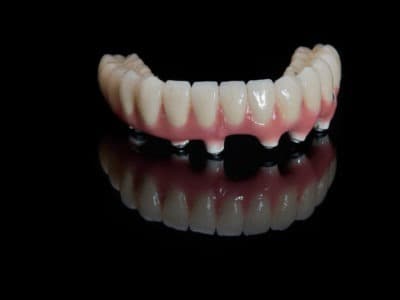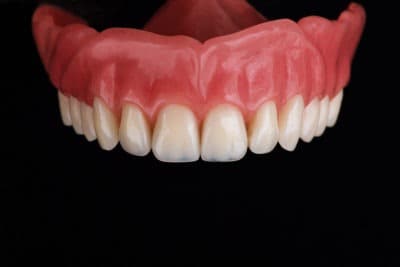Dentures
Dentures are a popular oral prosthesis used to replace missing teeth. They consist of a flesh-colored acrylic base meant to imitate gums and rows of natural-looking, artificial teeth.
Dentures are removable and are usually held in place in your mouth with suction or your own jaw muscles.
Who Can Get Dentures?
If you have loose or missing teeth and are experiencing issues with talking and eating or don’t like how your empty gums look, you may consider asking your dentist about dentures.
It is important to address the cause behind your missing teeth to determine if it is disease-related. Many people who lose teeth to tooth decay, gum disease, and oral infections are good candidates for dentures once the disease or infection is under control.
Implant-retained solutions for Dentures
Dentures are fixed securely onto 2, 4,or 6 implants for stability and support. This is an alternative for a denture only solution. These supporting structures may be fitted on the implants in two ways, either by having a removable overdenture which clicks on the implants or a non-removable implant-bridge which is secured on the implant with a screw.
This treatment is popular because it is less expensive than dental implants only. However, the implant solution is considered to be of higher quality. Dentures only (as opposed to implant-supported dentures) are inconvenient and less stable if not fitted correctly. They make it difficult to chew a number of food types, also can affect the way you speak.
As a result of implant-supported denture treatment, you will enjoy greater comfort and confidence. It will also allow you to chew and speak properly. Implant-retained denture is recommended if you lost all your teeth. If properly placed, it provides a lasting solution.

What is an implant-retained denture and why should I have one?
Traditionally, people with missing teeth have faced two options; a toothless smile or an unsecured denture. While the second option may help to keep up appearances, many find the experience of wearing dentures painful, inconvenient and embarrassing.
Not only is chewing and enjoying certain foods a problem, but eating comes with the worry that the dentures will slip out and cause embarrassment. Speaking and laughing carry the same risk. As gums recede and dentures lose their snug fit, sore spots can develop as the prosthesis slips around the mouth. Speech can also be affected.
A means of overcoming these problems and enjoying a restored, confident smile is presented by an Implant-retained Denture. Unlike traditional dentures that rest on the gum, this type of denture is attached to and supported by implants. With this firm foundation of support, the denture feels stable and secure. The wearer can eat, speak and laugh as normal, free from worry or mishap.
Implant-retained solution Options
Solutions that require a greater number of implants (such as the fixed full-arch bridge) may require areas of low bone density to be built up using a bone graft before implantation. Others (such as the all-on-4 style) manage to avoid the need for a bone graft by strategic placement of the implants. These solutions offer you fixed, non-removable bridges.
Your dentist will discuss the most suitable options with you during your consultation.
All-On-4
Requires as few as 4 implants and a full dental arch. It also avoids the need for a bone graft by tilting the placement of the posterior implants using available bone. However, the low number of implants carries an increased risk if one fails impacting the bridge. This procedure does carry an excellent cost to benefit ratio.
Fixed Full-Arch Bridge
Requires 4-8 implants and a fixed dental bridge. The increased number of implants reduces the possible risk should one fail but does increase the cost.
Implant-Retained Overdenture or Clip-On Denture
Requires 2 or 4 implants and a removable prosthesis. This type of denture provides more support than a traditional denture and is the most cost effective version. However, this is similar to traditional dentures and can result in sore spots and may be less stable than other options.
What’s the Process for Fitting an Implant-retained Denture?
The stages and timeframes for fitting an implant–retained denture can vary depending on each individual case.
Is There Recovery Time After Getting Dentures?
If you had to have teeth removed before getting dentures, you may require some healing time after that step. Your dentist will give you a timeline and instructions for healing.
There is no recovery needed once you receive your new dentures, but it will take some time to get used to speaking and eating with them in your mouth. Here are some tips for adjusting to your new dentures:
Benefits of Dentures
It can be incredibly difficult to speak and chew properly when you have many missing or loose teeth. Using dentures can restore these abilities to you.
Furthermore, dentures will give your mouth and jaw better shape and a new and improved smile for better confidence!
While other dental prosthetics also offer these benefits, dentures can be a more cost-effective option. They are also not permanent, unlike dental implants, which some patients may find preferable.
Frequently Asked Denture Questions
Get Treatment Estimate
Before stepping foot in our dental office, we provide you with a preliminary treatment estimate.
It’s 100% free, and with no commitment.

